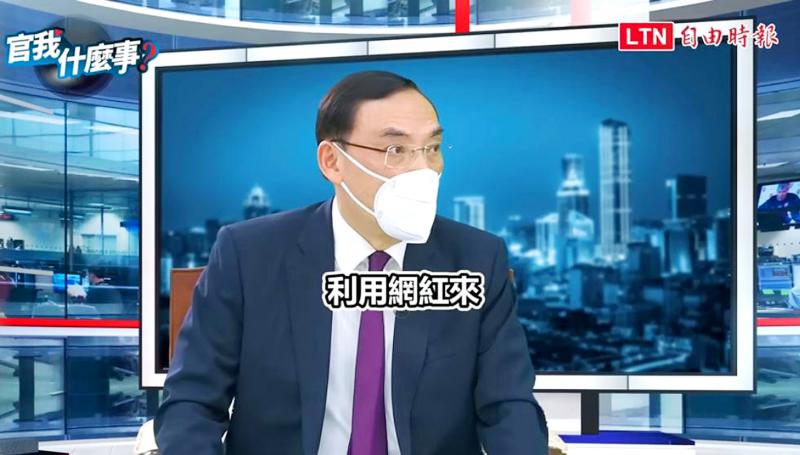The Ministry of Justice has become aware of “external forces” paying Internet streamers to make false statements in an attempt to influence November’s nine-in-one elections, Minister of Justice Tsai Ching-hsiang (蔡清祥) said yesterday.
Tsai made the remarks in an interview with the Chinese-language Liberty Times (the Taipei Times’ sister newspaper), the contents of which were aired yesterday.
The ministry is continuing to monitor such behavior and would strive to combat cognitive warfare tactics, he said.

Photo: screen grab from Guan Wo Shenme Shi
Attempts to influence Taiwanese politics by giving Internet personalities and streamers money and having them spread false information is a new tactic, Tsai said.
“External forces have been known to use a variety of methods to influence Taiwanese politics,” such as subsidizing a particular group or candidate through Taiwanese businesspeople, or exerting influence over local temples to have them persuade local residents to vote for certain candidates, he said.
Other methods have involved Chinese spouses in Taiwan and underground banking institutions offering voters all-expenses-paid trips to China, he added.
Tsai said that he places great emphasis on national security and because of this, he has arranged for prosecutors to attend seminars by national security experts so that they can prosecute cases involving national security issues based on what is best for protecting Taiwan.
The ministry has also drafted an amendment to the National Security Act (國家安全法) that would send criminal cases involving people or organizations nominally controlled by a foreign power, China, Hong Kong or Macau straight to the second appellate court, Tsai said.
The amendment would also make corporate espionage a criminal act, as well as leaking the nation’s core technological secrets to foreign assets, he said.
The technology sector is an important asset for Taiwan and crucial to its national security, he added.
While local elections have always been the most prone to corruption, modern technology can spread false information swiftly, an issue the ministry must seek to control, Tsai said.
“We aren’t ruling out the possibility of external forces utilizing modern technology, such as e-wallets and blockchain technology, to facilitate such payments,” he said, adding that the ministry would also be monitoring the spread of false information and nip it in the bud.

INVESTIGATION: The case is the latest instance of a DPP figure being implicated in an espionage network accused of allegedly leaking information to Chinese intelligence Democratic Progressive Party (DPP) member Ho Jen-chieh (何仁傑) was detained and held incommunicado yesterday on suspicion of spying for China during his tenure as assistant to then-minister of foreign affairs Joseph Wu (吳釗燮). The Taipei District Prosecutors’ Office said Ho was implicated during its investigation into alleged spying activities by former Presidential Office consultant Wu Shang-yu (吳尚雨). Prosecutors said there is reason to believe Ho breached the National Security Act (國家安全法) by leaking classified Ministry of Foreign Affairs information to Chinese intelligence. Following interrogation, prosecutors petitioned the Taipei District Court to detain Ho, citing concerns over potential collusion or tampering of evidence. The

‘FORM OF PROTEST’: The German Institute Taipei said it was ‘shocked’ to see Nazi symbolism used in connection with political aims as it condemned the incident Sung Chien-liang (宋建樑), who led efforts to recall Democratic Progressive Party (DPP) Legislator Lee Kun-cheng (李坤城), was released on bail of NT$80,000 yesterday amid an outcry over a Nazi armband he wore to questioning the night before. Sung arrived at the New Taipei City District Prosecutors’ Office for questioning in a recall petition forgery case on Tuesday night wearing a red armband bearing a swastika, carrying a copy of Adolf Hitler’s Mein Kampf and giving a Nazi salute. Sung left the building at 1:15am without the armband and apparently covering the book with a coat. This is a serious international scandal and Chinese

Seventy percent of middle and elementary schools now conduct English classes entirely in English, the Ministry of Education said, as it encourages schools nationwide to adopt this practice Minister of Education (MOE) Cheng Ying-yao (鄭英耀) is scheduled to present a report on the government’s bilingual education policy to the Legislative Yuan’s Education and Culture Committee today. The report would outline strategies aimed at expanding access to education, reducing regional disparities and improving talent cultivation. Implementation of bilingual education policies has varied across local governments, occasionally drawing public criticism. For example, some schools have required teachers of non-English subjects to pass English proficiency

TRADE: The premier pledged safeguards on ‘Made in Taiwan’ labeling, anti-dumping measures and stricter export controls to strengthen its position in trade talks Products labeled “made in Taiwan” must be genuinely made in Taiwan, Premier Cho Jung-tai (卓榮泰) said yesterday, vowing to enforce strict safeguards against “origin laundering” and initiate anti-dumping investigations to prevent China dumping its products in Taiwan. Cho made the remarks in a discussion session with representatives from industries in Kaohsiung. In response to the US government’s recent announcement of “reciprocal” tariffs on its trading partners, President William Lai (賴清德) and Cho last week began a series of consultations with industry leaders nationwide to gather feedback and address concerns. Taiwanese and US officials held a videoconference on Friday evening to discuss the